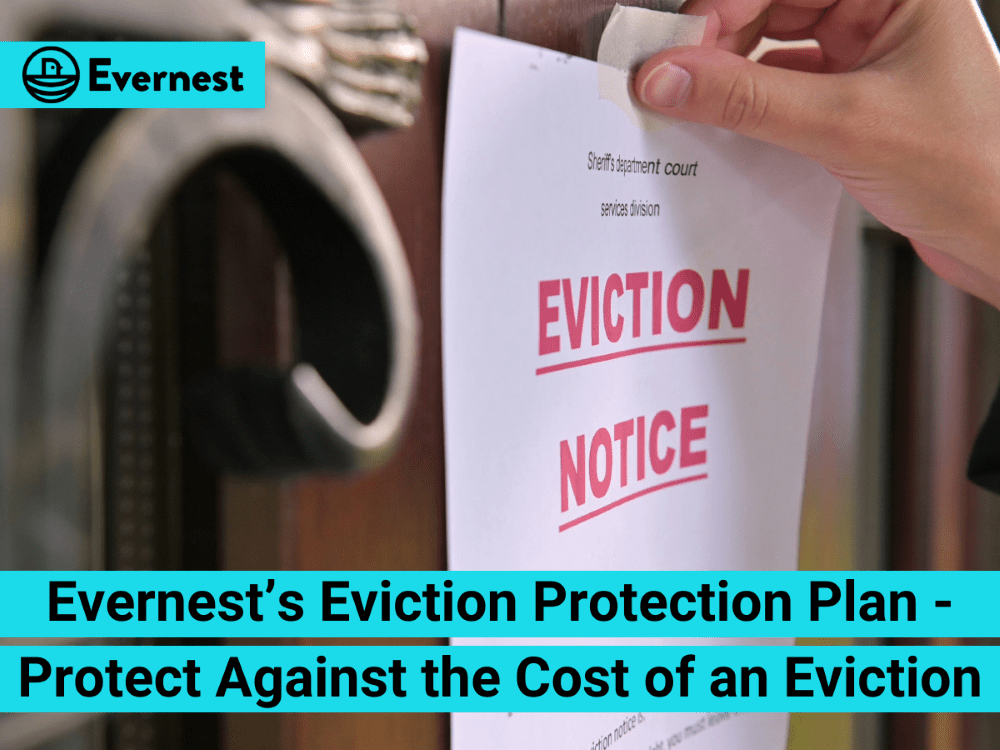Eviction is one of the most intimidating and complex parts of being a landlord. The eviction process can be particularly daunting due to its multifaceted nature, involving legal intricacies, potential financial implications, and the emotional toll it can take on everyone involved.
Follow along as we explore the circumstances that warrant eviction, the legal process, and the average cost of eviction. The information you’ll find below is tailor-made to provide landlords with the knowledge needed to navigate this critical aspect of property management effectively. But, as a bonus, we’ll share all about our Eviction Protection Plan too, if you’d like to circumvent this process entirely.
Let’s dive in!
Table of Contents
What Is Eviction?
Eviction is a legal process through which a landlord removes a resident from a rental property. This action is typically initiated due to a breach of lease terms and involves specific legal steps to be done properly. If not done properly, landlords face potential consequences that are anything but pleasant including financial penalties, legal expenses, resident lawsuits, and more.
Evictions in the United States are governed by individual states and by certain municipalities so it’s important to understand the specific laws in place where a rental property is located. It’s usually best practice to seek legal counsel who is knowledgeable on the regulations in the property area when taking on an eviction for this very reason. A local property management company may also be able to assist with a legal eviction.
Reasons for Eviction
A landlord may decide to evict a resident for any of the following reasons:
- Nonpayment of rent
- Damages to the property
- Illegal activity
- Violating the terms of a lease (e.g. residents living on the property who are not on the lease)
- If the landlord wants to take possession of the property
Legal Process for Eviction

While eviction laws vary by state and municipality, the basics of the process remain the same. The steps are typically as follows:
- A landlord serves their resident with an eviction notice that outlines a timeline for the resident to remedy the issue that led to eviction.
- If the resident fails to address the issue within the specified timeframe, the landlord may initiate legal proceedings by filing an eviction lawsuit. The objective is to seek financial restitution for unpaid rent, utility costs, property damage, late fees, and court expenses, in addition to pursuing the eviction process.
- Typically, cases are brought before district courts, small claims courts, or housing courts. Attendance is mandatory for both landlords and residents and both sides can seek legal counsel. Courts expect proof of wrongdoing which can include photos, emails, text messages, other relevant documents, and witness testimonies to support each case.
- A judge will listen to testimonies and examine all of the evidence presented in court. The judge will then determine whether to proceed with the landlord’s eviction case or dismiss it. The judge may deliberate on whether to grant monetary damages and, if so, the amount to be awarded.
Costs Associated with Eviction
The financial aspect of eviction poses a significant concern for landlords. These costs can vary, but some common expenses include:
- Court fees associated with filing to initiate an eviction lawsuit. These can range from a few hundred to several hundred dollars, depending on the location.
- Attorney fees. These costs can accumulate quickly if a landlord chooses to hire legal representation to assist with the eviction process. Attorneys may charge an hourly rate or a flat fee for an eviction-specific service.
- Sheriff’s or Constable fees. These costs can come into play if law enforcement needs to execute the eviction.
- Storage and moving costs. These charges may be incurred if the resident’s belongings need to be stored or moved as a result.
- Property repairs and cleaning costs. These costs are typical when any resident moves out of a property to prepare the rental property for the next resident.
- Lost rent. These costs can accrue if the property sits unoccupied during the proceedings or if it takes longer than usual to find a new resident.
- Utility costs. Charges for utilities can stack up if the landlord is responsible for covering them during the eviction process.
- Court-ordered damages. These funds may be awarded to the resident or landlord in some eviction cases, depending on the circumstances.
Landlords need to consider all potential costs and, if possible, explore preventive measures such as thorough resident screening and clear lease agreements to minimize the likelihood of eviction and associated expenses. Additionally, having an eviction protection plan, like those offered by property management companies such as Evernest, can provide financial security in case of unforeseen circumstances leading to eviction.
The Solution: Evernest’s Eviction Protection Plan
By now it’s clear the significant toll an eviction can take on a landlord and their property. While it’s all a bit daunting, there are proactive measures out there that provide landlords with security and support should this challenging situation ever arise!
Evernest’s Eviction Protection Plan (EPP) protects landlords from the costs and hassle of facilitating an eviction. For just $200 annually, the EPP covers all attorney fees, court costs, and charges associated with evicting an undesirable resident. We’ll also facilitate changing the locks on your rental property, so it remains safe while searching for a new resident.
Ready to elevate your property management game and shield yourself from eviction headaches? Tap into the expertise and support we can offer you at Evernest. Check out our website now and locate our team in your area to get started today!
Already an Evernest owner? Sign up for the EPP here.


